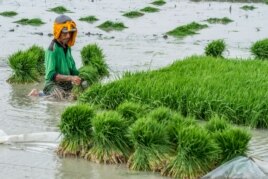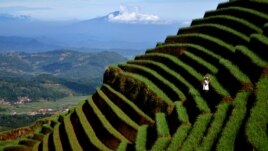14 November, 2018
Four years after taking office, Indonesian President Joko Widodo's goal of food sovereignty continues to be a work in progress.
The president, known locally as "Jokowi," believes Indonesians should be able to produce as much rice, corn and soy as the country needs. But the government's decision to import 100,000 tons of corn for animal feed through the end of 2018 shows how far Indonesia is from the goal.
The Indonesian Ministry of Agriculture said the decision was made because the price of corn has risen as a result of transportation costs and other issues, not a decrease in production.
Agung Hendriadi is head of the Food Security Agency at the Ministry of Agriculture. He said that Indonesia produces enough corn to meet the local demand. "In fact, our production has a surplus," he said.
As of 2018, the country produces 28.48 million tons of corn.
Food sovereignty vs. security
Dwi Andreas Santosa is a professor at the Bogor Agricultural Institute in Bogor, Indonesia. He says the idea of food sovereignty includes protecting farmers against what he called an unfair international trading system.
Santosa said that importing large amounts of commodities almost always hurts farmers. The goal of food sovereignty is different from food security, he added. Food sovereignty means a country can produce as much food as it needs. Food security means a country will find the food it needs, whether it be from production or imports.
The Indonesian National Statistics Agency reports that Indonesia increased its farm exports by 24 percent from 2016 to 2017. But Santosa argued the country's needs for imported commodities has also increased.
"(Importing of) seven main commodities rose from 21.7 million tons in 2014 to 25.5 million tons in 2017. Last year, Indonesia became the biggest wheat importer," he said, adding that Indonesia imported 12.5 million tons of wheat in 2017.

A farmer plants rice seeds at a rice field in Demak, Indonesia, Oct. 23, 2018. Picture taken October 23, 2018. Indonesia grows rice, but it also imports it.
Wheat imports
Indonesian farmers cannot grow wheat in the country. And because the government reduced imports of corn by 60 percent, wheat imports for animal feed jumped by 1,500 percent between 2015 and 2016.
Hendriadi explained that his ministry has a program to change the commodities used in food production to reduce imports. They will use locally produced crops instead of using imports.
Widiyanto is with Oxfam, an alliance of 20 independent aid groups. He said Jokowi's government needs to create a national food agency if it really wants food sovereignty.
In Indonesia, the agriculture ministry supervises the production of crops, while prices are controlled by the trade ministry. Farm stock is the responsibility of the Logistics Affairs Agency.
Widiyanto noted that Indonesia has lost more than 600,000 hectares of farmland over the past five years. That leaves the country with 7.1 million hectares of active land. But the majority of the farmers own less than 2 hectares of land.
The Oxfam official agreed with a presidential decree announced on October 10. The measure will guarantee land certification for farmers, enabling them to borrow money and take on more land. It also gives Indonesians rights to deal with local forestry issues.

A farmer tends to an onion crop on the slopes of Mount Cereme, Majalengka, West Java, Indonesia. (Photo courtesy: Antara Foto/Agvi Firdaus/ via Reuters)
Truthful information about production
The government has also admitted that a lack of correct, detailed information is one of the biggest problems for Indonesian agriculture.
Starting this year, rice production numbers will come only from the National Statistics Agency or BPS. Santosa said that the BPS does not have conflict of interest concerns, but other agencies might.
Santosa said the idea of food sovereignty should aim to increase the earnings of farmers since they are the most important people in food production.
Fewer farmers
At present, Indonesian agriculture is losing money and many farmers have left their fields for other work. Yet the government seems mainly concerned with the amount of production and export.
"Indonesia lost 5 million farmers who stopped farming activity in the last 10 years," Widiyanto said.
But Hendriadi said he sees an improvement since the presidential decree.
"Jokowi's program (for food sovereignty) is running well, we are already self-sufficient in rice," he added.
I'm Susan Shand.
VOA's Amanda Siddharta reported this story. Susan Shand adapted this story for Learning English. George Grow was the editor.
________________________________________________________________
Words in This Story
sovereignty – n. a country's independent authority and the right to govern itself
logistics – n. the things that must be done to plan and organize a complicated activity
stock – n. a share of the value of a company which can be bought, sold, or traded as an investment
decree – n. an official order given by a person with power or by a government
self-sufficient – adj. being able to meet one's needs
certification – n. the act of documentation
commodity – n. a product of agriculture or mining